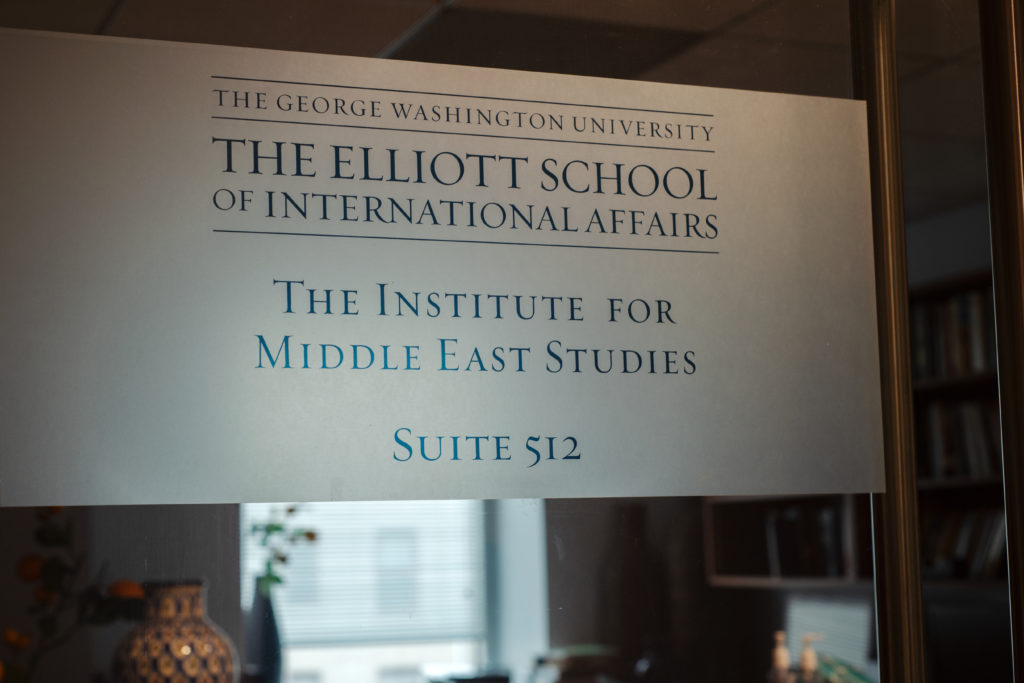A pair of summer grants to The Institute for Middle East Studies will fund a fellowship program and academic partnerships with non-GW faculty this fall.
Mona Atia, the director of the institute, said it received two grants for the school year from the Department of Education – a nearly $300,000 Foreign Language and Area Studies fellowship grant and a National Resource Centers grant exceeding $240,000. She said the funding will go to students in the institute’s Foreign Language and Area Studies Fellowship Program and the institute’s development of academic materials, like infographics, on the Middle East for non-GW educators who have not studied the region closely.
“I would say the first thing is the fellowship support for the students,” she said. “Because, as you know, the cost of GW is quite expensive, and there are many students for whom, without these awards, they would not be able to come to the University.”
Members of the Foreign Language and Area Studies Fellowship Program at GW receive funding for 20 credits of their tuition and a $20,000 living stipend, according to the institute’s website.
Atia said the National Resource Centers grant designates the institute as one of the country’s “premier institutions” in Middle East studies and will fund the creation of “multimedia resources,” like maps and political cartoons, for K-16 instructors who want to educate their students about the Middle East.
“Scholarship is our bread and butter, it’s what we do, but making it accessible and providing different formats or different learning styles, that’s really important to reaching a broader public,” she said.
Atia said the institute will develop partnerships with faculty at “minority-serving institutions,” like Historically Black Colleges and Universities, with funding from the National Resource Centers grant to support the study of the Middle East at their respective institutions. She said the institute is launching a partnership with Howard University to produce its annual conference on Middle East studies as a joint effort in February.
“One of the things we really worked hard at was to build some partnerships with local minority-serving institutions,” she said. “Again, that was something that we had struggled with in the past.”
Atia said when she became director in 2018, the institute had recently earned the Foreign Language and Area Studies Fellowship grant for the 2018-22 cycle but did not earn the National Resource Centers grant. She said the institute had not received both the fellowship grant and the National Resource Centers grant since the 2014-18 cycle.
Atia said she viewed the loss of the National Resource Centers grant in 2018 as an “opportunity” to determine what the institute’s strengths were and direct their approach to applying for both grants this past year.
“When we wrote this application, I tried to really draw on our strengths and the networks that we had built,” she said.
Atia said when drafting its proposal for the two grants in September 2021, the institute’s staff included data relating to Middle East studies that it compiled from its work with the Elliott School of International Affairs and the department of classical and near eastern languages and civilizations.
“A lot of it is just data gathering and data collecting and then figuring out how do you present that data in a compelling way,” she said. “How do you tell the story of Middle East studies at GW, showing all the breadth of diversity across the fields?”
Atia said the grants will renew every year from 2022 to 2026 upon annual congressional approval.
“My understanding is it’s sort of a technicality,” she said. “As long as you submit your forms, and barring the federal government shutting down or something, that the money comes through.”
Tahreem Alam, a second-year graduate student in the Elliott School’s Middle East Studies program, said receiving the scholarship and the stipend from the fellowship allowed her to attend the University without taking out large loans.
“It covers your tuition and gives you a living stipend, so I was able to move up to D.C. as well,” she said. “And for that reason, I’m able to go to graduate school, take internships here and start a life here, rather than staying behind or working somewhere else before reapplying to graduate school.”
Alam said the fellowship requires her to take a language class every semester. She said she is learning Arabic and studied abroad in Jordan this past summer through her fellowship.
“I was looking for programs for masters where I can travel so I could really immerse myself in the language and become native professional proficiency,” she said. “So I feel like I’ve gotten that from this program.”
Alam said she meets the other fellows through the program in meetings the institute hosts to help the fellows get to connect with one another and the language courses they are required to take.
“When you have questions you just ask each other, and they act as members of your cohort too because you have that connection of being in the same fellowship,” she said.








